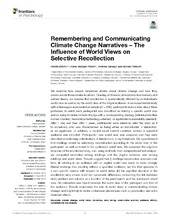Remembering and Communicating Climate Change Narratives – The Influence of World Views on Selective Recollection
Peer reviewed, Journal article
Published version

Åpne
Permanent lenke
https://hdl.handle.net/1956/22303Utgivelsesdato
2019-05-07Metadata
Vis full innførselSamlinger
Originalversjon
https://doi.org/10.3389/fpsyg.2019.01026Sammendrag
We examine how people remember stories about climate change and how they communicate these stories to others. Drawing on theories of reconstructive memory and cultural theory, we assume that recollection is systematically affected by an individual’s world view as well as by the world view of the target audience. In an experimental study with a Norwegian representative sample (N = 266), participants read a story about three politicians, in which each protagonist was described as holding a specific world view and as trying to tackle climate change with a corresponding strategy (individualistic/free market oriented, hierarchical/technology-oriented, or egalitarian/sustainability-oriented). After 1 day and then after 1 week, participants were asked to retell the story as if to somebody who was characterized as being either an individualist, a hierarchist, or an egalitarian; in addition, a neutral recall control condition without a specified audience was included. Participants’ own world view was assessed and they were classified as endorsing individualism, or hierarchism, or egalitarianism. We hypothesized that retellings would be selectively reconstructed according to the world view of the participant, as well as tuned to the audience’s world view. We assessed the cognitive structure of the recollected story, and, using methods from computational text analysis, we computed similarities among retellings and the original narrative, and among retellings and world views. Results suggest that (i) retellings become less accurate over time, (ii) retelling to an audience with an explicit world view leads to more strongly filtered retellings than recalling without a specified audience, but the filter operates in a non-specific manner with respect to world views, (iii) the cognitive structure of the recollected story shows small but systematic differences concerning the link between story problem and solution as a function of the participant’s and the audience’s world view. No interaction was found between the world view of the participant and that of the audience. Results emphasize the role of world views in communicating climate change, and might help to better understand phenomena such as polarization and echo chamber effects.
